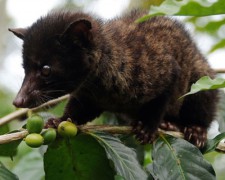The worlds most expensive coffee has uncanny origins. Amazon sells a four ounce bag of it for $44.95, and some adventurous coffee shops charge upwards of 8 British pounds for a cup. Unless you’re like me and enjoy the occasional culinary adventure, it may be more than the price that quells your curiosity.
I’ve been out to try this unusual bean for years, it wasn’t till my cousins and I were driving through Munduk, a small village in the hills of Bali, when we came across a half finished restaurant with a big sign that read: “Kopi Luwak” which is Indonesian for “Asian Palm Civit Coffee” that I got to try a cup. Apparently this coffee is so good because it’s picked by a very smart asian palm civit that is trained to only select the ripest coffee beans and then put them in a small pouch that a farmer straps to the animals waist. Just kidding, actually the little mongrel eats the beans and shits them out! Then a farmer with well trained eyes finds the scat and collects it, washes it and roasts it. There are different reports to explain why this makes the stuff so good. Some reports say that its because the civit only eats ripe coffee fruits, while others claim it has to do with how the animals digestive tract effects the beans. To be honest the brew wasn’t as good as I imagined, but I didn’t complain. I only paid 6 bucks for 4 cups. I recon it was a bargain compared to western prices. It did have a smooth flavor, and was less bitter than normal coffee.
I got to talking with the owner of the cafe. His name is Nyoman, a handsome middle aged man who runs a small contracting business in Denpasar–Bali’s capital– and runs an organic coffee cooperative in Munduk when he isn’t working at his contracting gig. He gave me the low-down on farming issues in the area. Munduk used to be covered in tree crops such as clove, fruit, and coffee. Now farmers are cutting down these crops to plant hydrangeas (a type of flower) which cost more on the local market. He’s a local environmentalist who is trying to change this by switching to organics. This offers a higher market value than regular coffee and saves the water shed. The trees in the area keep the soil on the hillside and slow the movement of water down, Hydrangeas don’t. Selling Kopi Luwak also helps, because of its price. Kopi Luwak is gaining media attention in the west and demand is rising. This presents its own problem. Indonesians are making Kopi Luwak by putting large numbers of civits in cages and forcing them to eat coffee. Nyoman assured me this wasn’t the case for his coffee and offered me a tour of his land to show me that his beans were from wild animals. Today I took my father, and my sisters up to see Nyomans place. We hiked into the hills and saw Nyomans land, and even got to collect a few piles of coffee containing civet poo. On the way we saw a patchwork of different farming practices. There were various plots of land with lots of dead weeds on them, under coffee trees. I think they were spraying the area with round-up. Thanks Monstanto. Then there were some plots of hydrangea flowers, and there was one big piece of land that a Singaporean had purchased. It looked like Singapore; there were lots of ornamental plants, but nothing to eat. All the crops had been chopped down. Then there were the plots that were part of Nyoman’s cooperative. They included a variety of crops: clove, coffee, cacao, citrus, and hydrangea. Most of them were using companion planting methods. Hydrangea was planted next to mandarin trees, and coffee trees lived in the understory of clove trees.
The walk presented a patchwork of hope and degradation. Spending time with Pak Nyoman confirmed my belief that the heros of this century will not be the captains of industry, the rulers of nations, or the leaders of large religions. The hero’s are humble men like Pak Nyoman. People who make a small difference by finding funny solutions, like “Kopi Luwak” to address big issues like land degradation due to an unruly free-market economy. Nyoman doesn’t have money, power, or fame to gain influence and rally support. He has a few contacts, just enough knowledge, and a desire to help the people around him, and his intent is simple: make the world just a little bit better. If you have any ambition to make a difference, don’t fret about making a big difference, and don’t worry if you think your difference will be too small. Just focus on making the difference whatever the size.

